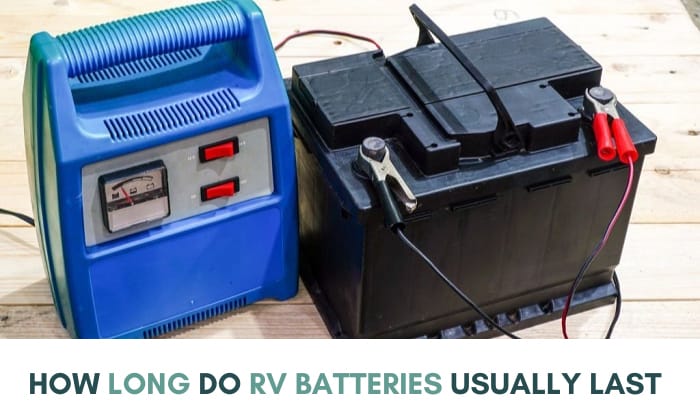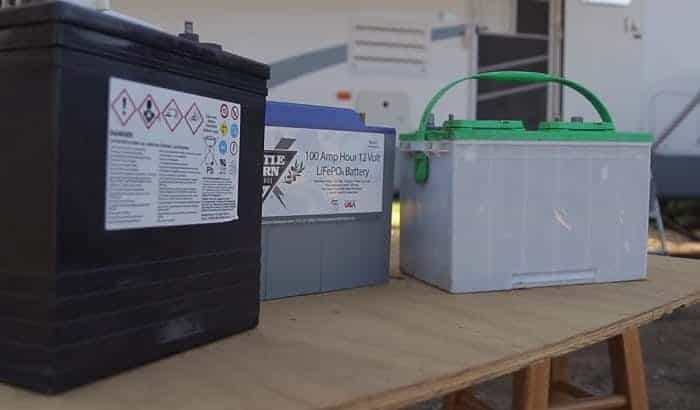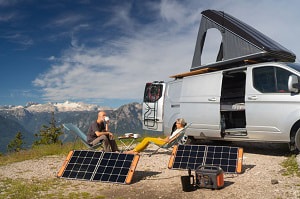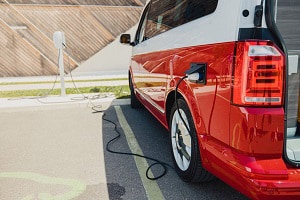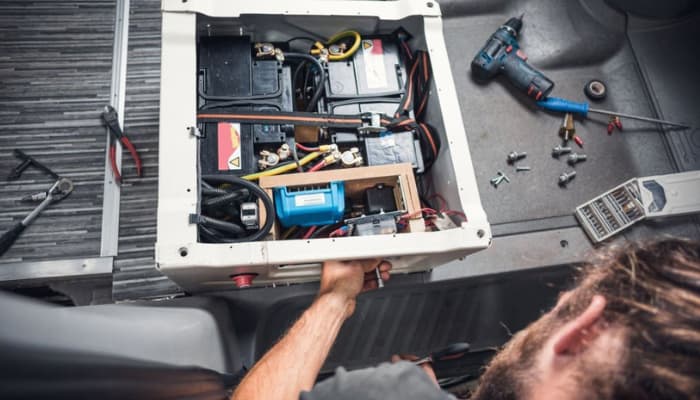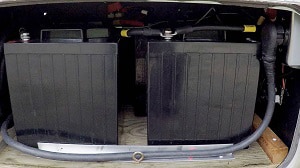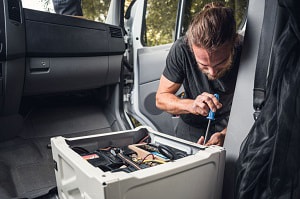If you ask manufacturers “how long do RV batteries usually last?”, you’ll get different answers. However, take note that the usual answer is within the ballpark of 2 to 3 years. This estimate is dependent on several factors, though. Here are some factors that affect the lifespan of an RV battery:
Page Contents
- Factors Affect the Lifespan of RV Battery
- The Proper Way of Maintaining the Batteries of Your RV
- 1. Make sure that the batteries are fully charged before using
- 2. Turn off the power main
- 3. Test the batteries if they are fully charged from time to time
- 4. Monitor the charge
- 5. Consider the temperature before recharging the batteries
- 6. Check the water levels of your batteries monthly
- 7. Clean your batteries often
- Conclusion
Factors Affect the Lifespan of RV Battery
1. Maintenance
If you maintain them well enough, RV batteries can last well over 5 years. During these five years or so, your batteries can produce the maximum amount of voltage that is required to operate the different appliances and components of your RV.
During this peak time of battery performance, you can go anywhere you like without having to worry about your batteries failing on you. One of the most common and important maintenance practices that you can do to prolong the life of your RV batteries is to top them up with distilled water from time to time.
This is especially true if you just came from a particularly long camping trip. When refilling the batteries, be sure to only use distilled water. Never use mineralized water as this can cause caustic buildup. Avoid overfilling the cells, too. Only go as high as a quarter-inch from the vents.
Another thing that is included in basic battery maintenance is cleaning the terminals. Over time, you will see scales accumulating on the terminals of the batteries. This is due to the metals oxidizing.
2. Type of Camping
You also need to consider what kind of camping trip you have in mind. Will you be “dry camping”, otherwise known as camping out in the wilderness with only your batteries as a source of electricity? Or will you be in a trailer camp with an external grid that you can hook up to?
If you will be dry camping then you can expect to do quite a bit of maintenance once you come home and while you are on the campsite. Furthermore, you will need some form of backup to recharge the batteries, like solar panels or a backup gas generator. On the other hand, if you have an external hook up then you can just reserve your batteries for later.
3. Storage
You should never place your RV batteries directly on the ground or floor. This will discharge your battery very rapidly and in some cases, it can even ruin your battery. Instead of putting it directly on the ground, place the battery on top of something, like a plank of wood.
If you stored your batteries on the floor of your garage for the express purpose of using them later, you will find that they have lost all their charge and in worst cases, they might not be able to hold a charge anymore. If you won’t be using your RV for a couple of months or so, you do not need to remove it from the RV. Just take off the negative ground wire so it will not discharge.
4. Charging
Do you even check if the batteries are fully charged whenever you get them back from charging or do you just assume that they are? Most RV users just assume that their batteries are already full and ready for your next camping trip, only to find out later that it is not the case.
Before you bring in your RV batteries for recharging, you should clean the terminals thoroughly first and make sure that they are in good condition. When you are at the charging station, make sure that the charging timeframe is followed. You should avoid rushing to charge the batteries. Using undercharged batteries will only cause considerable damage to them.
It will take roughly 72 hours to charge the batteries of an RV completely. Many rookie RVers leave their batteries to charge for a day, only to find out later that they do not have enough stored energy for their camping needs.
5. Power Demands
What devices in your RV and on your person will need to use electricity? How much energy do you use every day on average? If you have high power demands then it is possible that your RV’s batteries will not last that long.
When you have high energy demands, you will drain your RV’s batteries faster. When batteries are treated this way, they usually do not last more than two years. Using the right batteries for the job will make sure that there will be more than enough power for the rest of your RV.
For instance, when starting and keeping the engine running, you need to use the “chassis batteries” as you will be using large currents for short bursts. On the other hand, if you will be using the appliances in the RV’s living space then you will need to use the “coach” batteries because it is necessary to have a constant current over a long duration.
You should never interchange the roles of these two batteries as doing so will only damage the batteries.
The Proper Way of Maintaining the Batteries of Your RV
If you want your RV batteries to last longer than expected then here are some ways to maintain their excellent condition:
1. Make sure that the batteries are fully charged before using
This is more important if your RV is placed in storage for a while. If you will be putting your RV in storage while waiting for the next camping season, ensure that the batteries are fully charged.
Also, if you intend to keep your RV in storage for more than two months, recharge the batteries a bit every two months to prevent them from getting completely drained. If you will be taking your RV out for your next trip, make sure that its batteries are fully charged before you embark.
To ensure that you will get the best performance out of your batteries, you need to charge them properly. This means you have to charge them in stages. First, charge them regularly until they are at 90% full.
Next, do an absorption charge so that the batteries can build up the remaining 10% charge and prevent water loss. Lastly, do a float charge to keep the batteries at full charge.
2. Turn off the power main
Note that even if your appliances are not turned on, they will still leech electricity from the batteries if they are still plugged into the power sockets of your RV. If you do not want this to happen, turn off the power main and unplug all of the appliances inside the RV before you park it in storage.
If you will be storing the batteries separately, make sure to place them in a relatively cool place. It should be a place where the temperature does not exceed 60 degrees F to minimize the batteries’ self-discharge capability.
3. Test the batteries if they are fully charged from time to time
If your RV batteries are the ones that have vent caps and you happen to have a hydrometer in your toolbox, you can test if the batteries are fully charged. Use the hydrometer to get the specific gravity of each cell. If you get a reading that is between 1.27 and 1.285 then the battery is fully charged.
Furthermore, before charging your batteries, make sure that the vent caps are screwed on nice and tight, this will prevent water loss due to evaporation.
4. Monitor the charge
While you are still on the road, you need to monitor the amount of charge left in your batteries. As soon as they hit 80% capacity or if they get a voltage drop of around to 12.4V, you need to recharge them. Doing this will prevent sulfation, also known as battery memory. This is the state that prevents batteries from getting fully charged.
5. Consider the temperature before recharging the batteries
If the temperature outside is at a blistering 120 degrees F, do not recharge your batteries. The hot temperature can result in your batteries getting overcharged. At such a hot temperature, your batteries can suddenly catch fire or even vent and explode.
Also, do not recharge your RV batteries when it is still extremely cold outside. The cold weather will slow down the rate of charge of your batteries, which can also lead to sulfation.
6. Check the water levels of your batteries monthly
Do the checking more frequently if you use the RV quite often or if you live in a place where the temperature often goes off the scales. Check each cell. The water should just be barely touching the bottom of the refilling hole.
If any part of the battery plates is exposed, refill the cell with distilled water before recharging it. Never use tap water as it contains numerous minerals that will cause sulfation on your batteries. The plates should be covered with at least half an inch of electrolyte fluid. Aside from the water level, check the acid levels of your batteries, too.
7. Clean your batteries often
If you see any bit of dirt or corrosion, scrub them off using a wire brush and equal parts of water and baking soda. Make sure that you unplug the batteries before you clean them.
Finally, always be cautious when handling RV batteries. Take off all your jewelry, piercings, and all metal from your body, wear rubber gloves and safety glasses. Most importantly, do not smoke or have any exposed flames near your batteries.
Conclusion
Having enough electricity for most of the creature comforts in your RV is one of the most important things that you have to consider before going on a trip. This is why you need to take better care of your RV’s batteries.
There is no definitive way to find out how long do RV batteries usually last but note that it greatly depends on how the RV owners take care of them. If you take good care of your RV batteries then it can potentially last up to five years, possibly a bit longer, without giving you any problems whatsoever.
“Hi, I’m Francis’ husband—Calvin. Our story began with our shared passion for traveling. I have had a career journey for over 11 years at Ford Motor Company, where I took on the role of BMS SW Process Engineer.
Together with my wife, I have dedicated countless hours to exploring every nook and corner of the world. Ten years living in an RV may seem long, but time seems to fly by when I’m doing what I love with the person I love.
FMCA’s 103rd International Convention & RV Expo in Gillette, WY,
Like my wife, I hope to help you see the beauty of traveling off the beaten path by sharing insights into this lifestyle. In addition to my corporate roles, I also launched our website – Outdoorbits, in 2015 and continue to contribute my knowledge and skills to the present day. And I’ll be completely honest with you—no hiding the truth or sugarcoating the possible challenges.
So, if you want to run away from the busy lifestyle to embrace nature, I’m your guy.”
